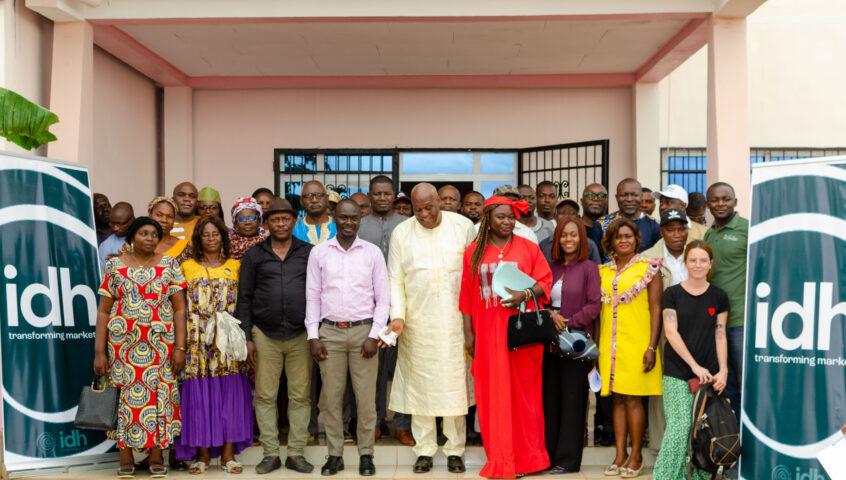
About
The Ntui municipality, headquarters of the Mbam and Kim Division in Cameroon’s Centre Region, covers 1,650 km² and comprises 27 villages, with an estimated population of 38,563 in 2021 (PCD Ntui, 2022). Ntui continues to experience steady population growth, increasing pressure on natural resources, agricultural land, and basic social services. The landscape is characterised by a mosaic of forest and wooded savannah ecosystems, crossed by a dense hydrographic network dominated by the Sanaga River and several secondary streams (Baseline Ntui, 2022).
1. Background and Context
Ntui is one of the main agricultural basins in Mbam and Kim, with a high dependence of rural households on agriculture as a source of livelihood. The Communal Development Plan (PCD) of this locality emphasizes sustainable land management, improvement of agricultural productivity and preservation of the environment (PCD Ntui, 2022).
Since 2022, IDH – The Sustainable Trade Initiative has been supporting the municipality through a landscape approach aimed at strengthening multi-stakeholder dialogue, sustainable land-use planning, restoration of degraded lands, and the promotion of sustainable agricultural value chains in the Mbam and Kim landscape (Baseline Ntui, 2022). This support seeks to enhance local governance, community inclusion, and long-term sustainability of economic activities.
2. Economic Characteristics
· Food crops are the main economic activity, including cassava, macabo and maize, which are essential for household food security (Baseline Ntui, 2022).
· Cash crops such as cocoa and banana/plantain offer opportunities for farmers to diversify their economy.
· Livestock (poultry, pigs, goats, cattle) and fishing on the Sanaga River complement sources of income and contribute to food security (Baseline Ntui, 2022).
· Non-Timber Forest Products (NTFPs), including djansang, kola, wild mango, and medicinal plants, play an important role in the domestic economy, especially for women (Baseline Ntui, 2022).
Despite this potential, the majority of households face low productivity due to a lack of inputs, limited access to finance, insufficient rural infrastructure, and weak structuring of farmers' organizations, which reduces agricultural profitability and household incomes (PCD Ntui, 2022). According to data from the baseline study commissioned by IDH in 2022, the majority of households surveyed have an average monthly income of between 25,000 and 50,000 CFA francs.
3. Environmental Profile
Ntui is located within a forest–savannah transition ecosystem, hosting rich biodiversity and valuable timber species such as Moabi, Sapelli, Ebony, and Iroko (PCD Ntui, 2022). However, land degradation is on the rise due to extensive farming practices, bushfires, unsustainable forest exploitation, and the effects of climate change (Baseline Ntui, 2022). Soil infertility, forest loss, and declining biodiversity pose growing threats to sustainable land use and ecosystem services.
With IDH’s support, the municipality is promoting land restoration, agroforestry, and climate-smart agricultural models that enhance ecological resilience and support long-term sustainability.
4. Social Profile
Ntui is a multi-ethnic municipality, historically inhabited by the Sanaga communities, along with migrant populations who have settled over time (Baseline Ntui, 2022). Women play a central role in agricultural production, food processing, and small trade, but continue to face barriers in accessing credit, land, and decision-making platforms (Baseline Ntui, 2022). Youth are active in farming activities, though often with limited access to economic opportunities and technical support. The PCD highlights social vulnerabilities related to limited access to basic services including health, education, potable water, and infrastructure (PCD Ntui, 2022).
In response, IDH promotes inclusive governance, encouraging the active participation of women, youth, and traditional authorities in participatory landscape management.
5. Key Sustainability Challenges
· Land degradation and growing pressure on natural resources driven by population growth.
· Low agricultural productivity due to limited inputs, rudimentary farming practices, and insufficient extension services.
· Biodiversity loss and deforestation linked to extensive agriculture and bushfires.
· Weak rural infrastructure (roads, storage facilities) limiting value addition and market access.
· Vulnerability to climate change, characterized by irregular rainfall, prolonged dry seasons, and declining soil fertility (Baseline Ntui, 2022).
6. Opportunities
With its agroforestry potential, community engagement, and the technical support of IDH, Ntui presents strong opportunities to:
· develop sustainable agricultural value chains (cassava, plantain, cocoa, oil palm, NTFPs);
· strengthen farmer organizations to improve access to markets, finance, and innovation;
· scale up land restoration, agroforestry, and reforestation initiatives, contributing to climate resilience;
· promote climate-smart agricultural practices to secure livelihoods (PCD Ntui, 2022).
IDH’s support provides a platform for stakeholder coordination, enabling a landscape model that combines production, natural resource protection, and social inclusion to achieve long-term sustainability.
